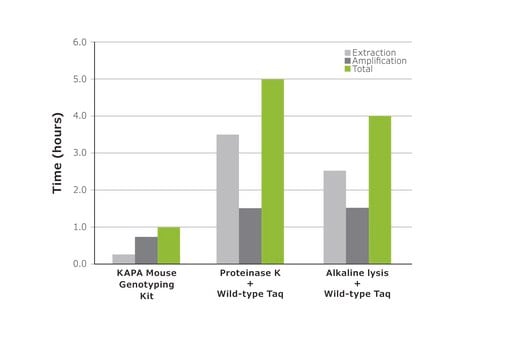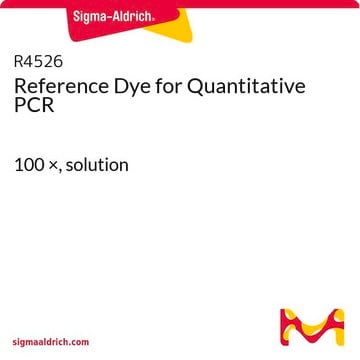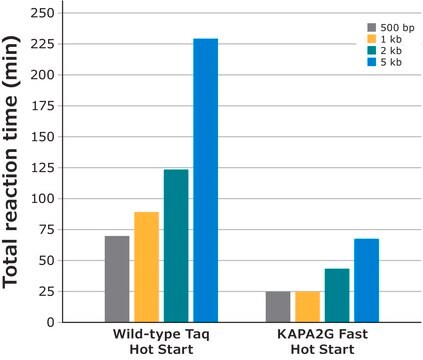P2893
JumpStart™ Taq ReadyMix™
Complete optimized reagent for hot-start PCR at 2X concentration
Synonym(s):
hot start PCR master mix, hot start master mix, hot start taq master mix, mutiplex PCR
About This Item
Recommended Products
Quality Level
form
liquid
usage
sufficient for 100 reactions
sufficient for 400 reactions
feature
Multiplex PCR
dNTPs included
hotstart
concentration
2.5 units/reaction (50 μL reaction volume)
technique(s)
PCR: suitable
color
colorless
suitability
suitable for (quantitative PCR)
application(s)
agriculture
shipped in
wet ice
storage temp.
−20°C
General description
Application
- For PCR amplifications that require reduced non-specific amplification
- For multiplex PCR
- For reduction of primer dimers
Features and Benefits
- The master mix allows consistency from one reaction to the next
- Reduced preparation time and reduced risk of contamination from multiple pipetting steps
- Designed to minimize non-specific amplification and contamination
- Increased specificity and target yield
- Reduced primer dimers
- Reduced set-up time as compared to manual or wax Hot Start methods
- Allows for room temperature set-up
- Ideal for high throughput, quantitative PCR applications
Packaging
100RXN is packaged as 1 X 2.5 mL
400RXN is packaged as 1 X 10 mL
Other Notes
This product has been validated in quantitative PCR, but may require supplementation with magnesium chloride solution, 25 mM, Catalog Number M8787, a suitable fluorescent probe, and, if desired, an internal reference dye, Catalog Number R4526. View more detailed information on JumpStart Taq ReadyMix products at www.sigma-aldrich.com/hotstart.
Legal Information
related product
Storage Class Code
10 - Combustible liquids
WGK
WGK 2
Flash Point(F)
Not applicable
Flash Point(C)
Not applicable
Certificates of Analysis (COA)
Search for Certificates of Analysis (COA) by entering the products Lot/Batch Number. Lot and Batch Numbers can be found on a product’s label following the words ‘Lot’ or ‘Batch’.
Already Own This Product?
Find documentation for the products that you have recently purchased in the Document Library.
Customers Also Viewed
Articles
Explore PCR's history, from discovery to Nobel Prize. Discover real-time PCR (qPCR) and digital PCR developments.
Real-time polymerase chain reaction allows researchers to estimate the quantity of starting material in a sample. It has a much wider dynamic range of analysis than conventional PCR
The purpose of Hot Start PCR is to inhibit the PCR reaction in order to reduce nonspecific amplification, prevent the formation of primer dimers, and increase product yields.
Protocols
Protocol using antibody mediated hot start polymerase. Method has short activation period (<1min), and results in higher yields and more specificity over standard PCR methods.
JumpStart™ Taq DNA Polymerase is an antibody-inactivated, hot start enzyme.
Related Content
Explore technology and reagent portfolios for plant breeding workflows, accelerating the development of new crop varieties.
Our team of scientists has experience in all areas of research including Life Science, Material Science, Chemical Synthesis, Chromatography, Analytical and many others.
Contact Technical Service















